AADL on Board with State Street CIA
Ann Arbor District Library board meeting (Nov. 11, 2013): In a 6-1 vote, AADL trustees approved a tax-sharing agreement for Pittsfield Township’s State Street corridor improvement authority (CIA). Nancy Kaplan cast the lone dissenting vote, saying she couldn’t support diverting dollars that taxpayers had intended for the library.
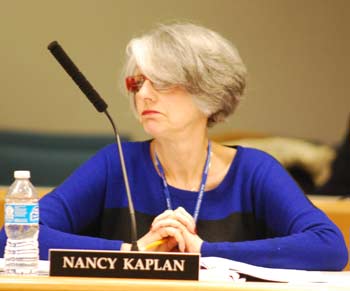
Ann Arbor District Library trustee Nancy Kaplan cast the only vote against approving a tax-sharing agreement between AADL, Pittsfield Township and the State Street corridor improvement authority. (Photos by the writer.)
For taxing entities that participate, a portion of revenues from local taxes would be used to provide matching dollars to help secure federal funding for road improvements and other features along the State Street corridor. The CIA covers a stretch roughly between Ellsworth and Michigan Avenue.
Although other trustees indicated that they shared Kaplan’s concerns, they were persuaded to support the CIA for several different reasons. Margaret Leary said she appreciated the transparency and openness of township officials during this process. She noted that in contrast to some other TIF arrangements, the tax-sharing agreement with the CIA is clear, comprehensive and was developed in a collaborative way. [Her reference to other TIF arrangements was likely an allusion to the Ann Arbor Downtown Development Authority. See Chronicle coverage: "Library View on DDA TIF Capture: Unchanged"]
Leary also pointed out that the CIA will create a situation that could benefit the AADL, which operates a branch in Pittsfield Township. If the overall tax base increases because of improvements to the State Street corridor, she said, then tax revenues for AADL will increase too. Barbara Murphy added that the amount of AADL tax revenue that will be diverted to the CIA is relatively small – about $120,000 over 20 years – compared to some other taxing entities.
Two people addressed the board during public commentary about the CIA. Prior to the vote, Christina Lirones – a former Pittsfield Township official – urged the board to opt out. At the end of the meeting, Don Salberg said he was disappointed in the board’s decision. He had expected AADL to opt out.
In addition to Pittsfield Township and AADL, other taxing entities within the CIA are Washtenaw County, Washtenaw County parks & recreation, Huron Clinton Metropolitan Authority (metroparks), Washtenaw Community College, and Saline District Library. At its Nov. 12 meeting, the Saline library board voted to opt out of the CIA. The metroparks board also decided to opt out, with a vote at its Nov. 14 morning meeting. The Washtenaw County board of commissioners and the county’s parks & recreation commission both voted in support of the CIA. WCC trustees have not yet made a decision.
Also during the Nov. 11 meeting, AADL director Josie Parker highlighted the fact that AADL had been awarded a five-star ranking by the Library Journal – the highest ranking awarded by the journal for library use in a community. AADL is the only library system in Michigan that achieved that level, and has been awarded this designation for five consecutive years. AADL is the only library in Michigan to ever achieve five stars.
And during committee reports, Nancy Kaplan noted that the communications committee has reviewed a report from Allerton-Hill Consulting. [.pdf of Allerton-Hill report] Some of the recommendations in the report include expanding the use of social media, publishing a quarterly newsletter to keep library patrons informed, and conducting a satisfaction survey to determine the priorities and public perception of the library, and to learn more about who is using the library, and why. The administration will now determine whether and how to implement the report’s recommendations.
During public commentary, Kathy Griswold urged the board to be more open and transparent, specifically by recording its meetings for broadcast.
Pittsfield Township State Street CIA
The AADL board had discussed Pittsfield Township’s State Street corridor improvement authority (CIA) at two previous meetings – on Oct. 21, 2013 and Sept. 16, 2013. It was originally on the Nov. 11 agenda for discussion only. But at the start of the meeting, the board revised the agenda to make it an action item.
Pittsfield Township created the new authority in July 2013 to help fund roughly $30 million in improvements on State Street over 20 years, roughly between Ellsworth Road and Michigan Avenue. The intent is to create a four-lane boulevard with a median, bike lanes and pedestrian pathways. Under the CIA’s tax increment financing (TIF) plan, 50% of the increase in taxable value within the CIA boundaries would be captured over a 20-year period to fund the CIA projects. [.pdf of TIF plan]
Currently, AADL receives about $8,536 in taxes from taxpayers in the proposed CIA boundaries. Over the 20 years, it’s estimated that $120,436 in AADL tax revenue would be diverted to the CIA. Details of the arrangement are laid out in a tax-sharing agreement between the AADL, Pittsfield Township and the CIA. [.pdf of AADL tax-sharing agreement]
The local tax revenues collected via the CIA will be used as matching funds to secure federal funding, which is expected to pay for 80% of costs.
Taxing entities have the option to opt out of the CIA, and have a 60-day period in which to make that decision. If the governing bodies don’t formally request that their taxes be exempt from TIF capture, then they will automatically participate in the CIA. That opt-out period began with an Oct. 9 public hearing held by the Pittsfield Township board, and will end in early December.
In addition to AADL, other jurisdictions that levy taxes within the CIA boundaries are: Pittsfield Township, Washtenaw County, Washtenaw County parks & recreation, Huron Clinton Metropolitan Authority (metroparks), Washtenaw Community College, and Saline District Library.
The Washtenaw County board of commissioners voted on Nov. 6, 2013 to approve a tax-sharing agreement with Pittsfield Township and the State Street CIA, outlining details of the county’s participation. About $3.8 million in county tax dollars is estimated to be captured during the 20-year period. The county parks & recreation commission also voted to support the CIA, which will capture about $600,000 in taxes from county parks millages.
The Washtenaw Community College board of trustees held a special meeting on Nov. 12, with a presentation on the CIA. Another board meeting is scheduled for Nov. 26, and would be an opportunity for trustees to make a formal decision on this issue. If WCC participates, about $3 million of its taxes would be captured over the 20-year period.
Also on Nov. 12, the Saline District Library board held a special meeting where it voted 6-1 to opt out of the CIA. According to Leslee Niethamer, director of the Saline District Library, the board had already voted in August to opt out. However, because the process requires that notification be given during the 60-day period that began Oct. 9, the board scheduled a special meeting to vote again on this issue. The CIA had hoped to capture about $900,000 of the library’s tax revenue over 20 years.
The director of the Huron Clinton Metro Authority, John McCulloch, sent an opt-out letter earlier this month to township supervisor Mandy Grewal. [.pdf of McCulloch letter] However, the board had not yet taken a vote following the Oct. 9 public hearing. At its morning meeting on Nov. 14, the board unanimously approved a formal opt-out resolution. The taxes at stake were roughly $181,000. [.pdf of opt-out resolution]
Pittsfield Township State Street CIA: Public Commentary
During public commentary at the start of the AADL’s Nov. 11 meeting, Christina Lirones introduced herself as a resident of Pittsfield Township, who lives in the Saline District Library’s district but who owns property in the AADL district. She passed out photographs to show improvements that have already been made on State Road, without the TIF funding from a CIA.
The road is frequently portrayed as just being a two-lane unimproved road, she said, but developers have made substantial improvements over the years. In most areas, State Street is three lanes, she noted, and those improvements have been paid for by developers. There are traffic signals at the intersections with Morgan and Avis Drive. And at the intersection with Textile, there were major improvements paid for through a special assessment, she said. Another major road improvement was done around the Walmart complex near Michigan Avenue. “It’s not as if it’s an unimproved road,” she said.
Lirones encouraged the board to opt out of the CIA, calling the project ill-advised. It was rushed through with a lack of transparency by township officials, she contended. She noted that she had served as the township clerk from 2000 to 2004, and as treasurer from 2004-2008. She also had served for eight years on the township’s planning commission, and had held the position of chair.
Through strong planning and political will at that time, she said, the township was able to negotiate with every development to secure road improvements. “I do not want to see library millage dollars diverted into road improvements in Pittsfield Township,” she said. It’s inappropriate and unfair to developers who have already paid for improvements, she argued, and will make it difficult to get developers to pay for additional improvements in the future. She wanted to see her tax dollars collected by AADL to be used for books and other activities of the library.
Lirones also provided a written statement to the board, and her statement at the Pittsfield Township board’s Oct. 9 public hearing was included in the AADL board packet. [.pdf of Lirones' statement to AADL] [.pdf of Lirones' statement at Oct. 9 township public hearing]
Craig Lyon, director of utilities and municipal services for Pittsfield Township, attended the AADL board meeting but did not formally address the board.
Pittsfield Township State Street CIA: Board Discussion
Margaret Leary began the discussion by making a motion to approve the tax-sharing agreement between AADL, Pittsfield Township and the State Street CIA.
Leary said she planned to support the agreement, saying it took a long time for her to reach that decision. She appreciated the openness and transparency that the township has used in this process. “In contrast to some other TIF arrangements, what we have here is clear – there’s no ambiguity about the agreement.” [Her reference to other TIF arrangements was likely an allusion to the Ann Arbor Downtown Development Authority. See Chronicle coverage: "Library View on DDA TIF Capture: Unchanged"]
It’s also a comprehensive agreement, she noted, and describes all the possible contingencies and what would happen in each case. The township was very collaborative, with representatives attending AADL meetings and answering questions. The township provided information in advance, and was willing to negotiate terms of the agreement, Leary said.
Another positive aspect was the fact that the TIF capture is 50%, not 100%, Leary said. The township is creating a situation in which the library stands to gain, she added, because the library’s tax base will increase as a result of improvements to the road and non-motorized features. It’s a project that will make the overall community better, she said.
“I think it’s good when governmental organizations can treat each other respectfully and collaboratively to make the community better for everybody,” Leary said.
Leary pointed out that each organization affected by this CIA proposal will do a different analysis – as there are different amounts of money at stake, and different benefits that might be gained. “I’m only speaking about my opinion of what I think is best for AADL,” she concluded.
Barbara Murphy agreed with Leary, and added that it was very clear what the limits are in this CIA. The library won’t be committing unknown amounts of money, she said. “That’s another reason I’m comfortable with it.”
Jan Barney Newman pointed to the terms of the agreement, which outlined what would happen if the CIA doesn’t secure sufficient funding to move ahead with the project. In that case, the AADL could get out of the agreement, she noted, “so we’re not just throwing money into a bottomless pit.”
Nancy Kaplan said it looked like she’d be the only dissenting vote. She agreed with many of the points made by Leary, and she had given it a lot of thought. She did appreciate the openness and clarity of the agreement and the TIF plan. She said it’s her understanding that Pittsfield Township was also quite cooperative and helpful during the process of building AADL’s Pittsfield branch library. However, that building is not near State Street, she noted – it’s on Oak Valley Drive.
About $120,000 would be diverted from the library over 20 years, Kaplan said. The public voted to fund the library, she added, “and we should keep the benefit of the tax dollars with the library, and not divert them to a road project to which they did not say the funds should be diverted.” It was her view that AADL should opt out of the proposed CIA, and not set a precedent.
Ed Surovell said he’d support the CIA. He noted that he’s not the only person on this board who has served on a planning commission. [Leary also is a former Ann Arbor planning commissioner.] He was going to support Pittsfield Township’s decision to do the project “through a democratic process.” When he was a planning commissioner, he said, he would have been cranky if someone from Pittsfield had told him that an Ann Arbor project wasn’t a good idea.
Responding to Kaplan’s comments, Leary said Kaplan had identified the crux of the issue that has bothered all trustees – taking revenues from the library millage and using them for a different purpose. If that was all there was to it, Leary said she’d probably be on Kaplan’s side. But that’s not all there is to it, she added.
There’s a state statute [Public Act 280 of 2005] that makes this funding mechanism possible, Leary noted, and the township used a democratic process to set up the CIA. It’s very difficult for municipalities to get money for projects like this, she said, and the state legislature set up this CIA structure in order to address that.
The whole concept of a TIF is to take tax revenues from one source and use it for a different purpose – it’s not just this CIA that’s doing it, Leary noted. If that’s not acceptable, then the way to fix it is to tell the state legislature and have them change the statute. This CIA approach is relatively new, and provides the ability for taxing entities to opt out. Leary pointed out that the opt-out option didn’t exist when the Ann Arbor Downtown Development Authority was created. She said she doesn’t necessarily like that the state legislature has set things up like this, “but I don’t know what the options are when communities need to fix things.” Roads need to be repaired, and sometimes the way to do that is “just flat-out uncomfortable,” she said.
Prue Rosenthal said the proposal also had given her pause, and she had been concerned. But sometimes “you have to spend money to make money,” she said. The road improvements will probably be to AADL’s advantage in the long-run, she added. She also expressed a strong belief in the “good neighbor policy” – even though it’s somewhat awkward, she acknowledged.
Murphy didn’t want to lose track of how much money was involved. If the TIF would take $500,000 or so a year from AADL revenues, that would be different, she said. But it’s only about $6,000 a year, and for that amount, the library should certainly participate, Murphy said. If it were a different amount, the library might not be able to afford it, she added.
Kaplan pointed out that Pittsfield Township has previously developed that area without TIF funding. To her, it’s the principle. She thinks the tax-sharing agreement is a “model agreement,” but taking taxpayer money away from the purpose for which it was intended is something she can’t support. She also didn’t think that removing the AADL’s $120,000 “would be the death knell” for the project, if the library opted out.
Surovell argued that Pittsfield Township took money that its taxpayers had approved for something else, and instead spent it on making municipal improvements that AADL hadn’t budgeted for at the library branch site. The township did it “without so much as asking for a nickel,” he said, and they had been wonderful partners. That amount hadn’t been spread over 20 years – it had been spread over 60 days, he said. He restated his support for the CIA.
Rosenthal concluded the discussion by thanking Christina Lirones for the information she provided.
Outcome: On a 6-1 vote, the board approved the tax-sharing agreement for Pittsfield Township’s CIA, over dissent from Nancy Kaplan.
Pittsfield Township State Street CIA: Final Public Commentary
During public commentary at the end of the meeting, Don Salberg told trustees that he was very disappointed by the board’s decision not to opt out. When the proposal was first presented to the board earlier this year, “I sensed a lot of skepticism on everyone’s part,” he said. He said he’d communicated in writing to some of the board members, and none of the responses he’d received from trustees had indicated that they were supportive of the CIA. So he had expected that they would opt out.
The board is being unfair to the voters who approved the library millage, as he had done. “I did not hope to have any of this money given to other authorities,” he said, saying he’s saddened by the amount that the Ann Arbor DDA takes away from the library. It might be a relatively small amount now, Salberg noted, but as property values in Pittsfield Township increase, it will become a more sizable amount. He said that if the library needs to go to taxpayers to ask for more money, AADL will need to ask for more than they’d otherwise need, because some of it will be taken by the CIA. He also wasn’t sure what the library would be getting out of this road improvement project. People who want to get to the library now don’t need to take State Street to get there. It’s a lose-lose situation, he said.
Christina Lirones wanted to speak again, but AADL’s rules for public commentary prevent someone from speaking twice on the same topic during the same meeting.
Director’s Report
AADL director Josie Parker elaborated on items in her written report. [.pdf of November 2013 director's report]
Highlights included a report on Halloween activities at the library, and a notice that Sherlonya Turner, AADL manager of youth and adult services and collections, would be participating in a panel discussion later this month on how the library is helping educating the public about the Affordable Care Act. It’s hosted by the Metropolitan Detroit Medical Library Group.
Parker also reported that Raphaela Muller – a librarian with a public library in Munich, Germany – arrived earlier that day and will be staying a week to learn more about AADL. Her visit coincides with International Games Day, to be held at AADL’s downtown building on Nov. 16.
Noting that it was Veterans Day, Parker reported that the library remains open on that day at the request of the local veterans administration. The library also organizes a card-writing event, with children writing cards that are taken to the VA Hospital. Over 150 cards were taken this year, she said.
Also, Parker noted that AADL regularly participates in storytimes at Mott Children’s Hospital, and she had taken part in that this month. Usually the children who attend are siblings and other family members of the children who are hospitalized, she said, and “it’s a bright spot during a difficult time for people.” In addition, Mott holds an event called the Skyline Cafe dinner, where local businesses sponsor dinner for the children and their families. AADL is part of the storytime during those dinners.
In her final item, Parker reported that the previous day she had attended a show by Bill Harley, a storyteller and musician. The library sponsors the free Sunday afternoon show, and The Ark provides a deep discount to rent its space. This year, about 175 people attended, she said.
Financial Report
Ken Nieman – the library’s associate director of finance, HR and operations – gave a brief report on the October 2013 financial statements. [.pdf of financial statements]
Through October, the library has received 95.5% of its budgeted tax receipts. It’s the high point in the library’s cash balance for the year, with $15.29 million in unrestricted cash. [The library's fiscal year starts July 1. Summer property taxes are collected in July.] The fund balance at the end of October was $8.027 million.
Six items are currently over budget, Nieman reported, but all of those items are expected to come back in line with budgeted amounts by the end of the fiscal year. The over-budget line items are: (1) purchased services; (2) communications, for an annual Internet-related payment; (3) software; (4) copier/maintenance expense; (5) library programming; and (6) circulation supplies.
There was nothing out of the ordinary during the month, he concluded.
The board had no questions.
Outcome: This was not a voting item.
Committee Reports
The board has six committees: communications, budget and finance, facilities, policy, director’s evaluation, and executive. Two brief committee reports were made during the Nov. 11 board meeting.
Committee Reports: Communications
Nancy Kaplan reported that the communications committee had met on Oct. 30 and received a report from Allerton-Hill Consulting to review. Copies of the report were available to the public at the meeting. [.pdf of Allerton-Hill report]
She highlighted some of the recommendations in that report:
- Expand the use of social media.
- Publish a quarterly newsletter to keep library patrons informed.
- Conduct a satisfaction survey to determine the priorities and public perception of the library, and to learn more about who is using the library, and why.
Kaplan pointed out that the recommendations dovetail with the goals that are part of AADL’s strategic plan for 2010-2015. The committee plans to meet again in two months, she said.
Rebecca Head said she was struck by the point that Allerton-Hill made about connecting with the citizens and key constituents, and about how important that is. As someone who worked in government a long time, she said, she agreed with the perspective of connecting with the people that AADL serves – not just once, but periodically.
Kaplan noted that Allerton-Hill suggests conducting a survey every two years. It’s also important to know who is not using the library, she said, so that the library can work to reach a broader audience.
Barbara Murphy wondered what the next steps would be for these recommendations. “It’s really in Josie’s court,” Kaplan replied. The communications committee had the opportunity to respond to the report, and could have rejected the recommendations – but committee members didn’t do that, she said.
Prue Rosenthal said the library “has its work cut out for us.” All the ideas in the report are great, she said, and are all about reaching out to the public. It’ll be an interesting time for everyone to learn new ways of reaching people who haven’t been reached and to do a better job of informing people, Rosenthal said.
Head referred to “a very thoughtful article” that AADL director Josie Parker had written. [It was a column written for the Journal of Library Administration, which is available only for subscribers.] One point in the article was that libraries have “overbranded” themselves in terms of books, Head said. And while it’s nice to be branded, it doesn’t tell the whole story. Head thought a survey like the one suggested by Allerton-Hill could be helpful in doing outreach and helping people understand what the library does. The library’s future includes books but is not limited to books, she said. Head praised Parker and the AADL staff for their forward-thinking approach.
Committee Reports: Budget & Finance
Nancy Kaplan also gave the report on the board’s budget and finance committee, which met on Oct. 29. The committee got a presentation from Charles Waterhouse of United Bank & Trust. He reported that the economic outlook remains positive, she said. The library has a laddered fixed-income portfolio of government bonds and taxable municipal bonds. It’s been AADL’s practice to hold the bonds until they come due, she said. So when trustees see reports showing a loss, it’s just a paper loss, Kaplan said. “If you hold [the bonds] until they come due, you get what you signed on for,” she said, and won’t lose money. She also pointed out that the library can’t invest tax revenue in the stock market or corporate bonds. That’s prevented by Public Act 20, she said, and AADL’s investments are governed by that.
At the committee’s Nov. 12 meeting, they planned to review the 2012-13 audit.
AADL director Josie Parker noted that the full board will receive an audit report at their December meeting.
Library Stats
Eli Neiburger – AADL’s associate director of IT and product development – gave a presentation on library statistics, providing details in five categories for the month of October: Collections, users, visits, usage and participation. The data is compared to year-ago figures, when available. He began by noting that October is traditionally a somewhat slower month, and “having a wet Halloween affects numbers in a big way.”
In addition to reviewing the standard data, Neiburger highlighted data regarding visits to AADL’s website. By far, the majority of visits come from users in the United States – 154,437 during October. The second most common country was France, with 4,632 visits. When asked why, Neiburger replied: “We’re not quite sure yet.” In September, there were about 22,000 visits from France, he reported.
Regarding the origin of users within the U.S., Neiburger said it was difficult to track, calling the analysis a “dark art” because IP addresses change frequently.
Outcome: This was not a voting item.
Five-Star Library Status
At the end of Eli Neiburger’s presentation on library statistics, AADL director Josie Parker highlighted the fact that AADL had been awarded a five-star ranking by the Library Journal – the highest ranking awarded by the journal for library use in a community. AADL is the only library system in Michigan that achieved that level, and has been awarded this designation for five consecutive years. AADL is the only library in Michigan to ever achieve five stars.
In its category – libraries with budgets between $10 million to $29.99 million – AADL ranked fifth nationwide. AADL’s annual budget is on the lower end of that category, at around $12 million. In this category, there are only 11 public libraries that achieved the five-star ranking nationwide.
Two other Michigan libraries also achieved star rankings: the Capital Area District Library (four stars), and West Bloomfield Township Library (three stars).
These rankings aren’t about how much money is spent or how many people the library employs, Parker said – it’s about how well the libraries are utilized in the community. Per-capita metrics include circulation, visits, program attendance, and public Internet terminal use.
In its category, AADL had the highest circulation per capita – at 53.7. Parker said she was pleased to note that a library that has always outranked AADL in terms of circulation per capita is in Flomaton, Alabama – “and I know where that is,” she joked. [Parker is from Mississippi, and attended college at Auburn University in Auburn, Alabama.]
Parker said AADL is proud of libraries all across the country that are serving the public so well. She’s proud that the Ann Arbor community uses the library year after year, and she thought it was appropriate to talk about it in the context of Neiburger’s presentation regarding data about how the library is used.
Board president Prue Rosenthal thanked Neiburger and Parker for their remarks, and started to move on with the next agenda item when Ed Surovell spoke up. “Hold on a second here,” he said. “You’ve just been told you’ve hit a home run, won the World Series, ranked No. 1 in the polls, walked on water – think about that. It’s an astonishing event.”
Parker reported that next year, the rankings will include wifi usage, “and I know for us, that will be hot.” It’s notable that AADL can maintain its ranking, she said, despite all the changes that the staff has to assimilate into its practices due to changes that technology brings. When AADL achieved its first five-star ranking, the news was posted on its website and there were a lot of comments almost immediately, she recalled. This time, it was 30 hours before the first comment was posted. However, when the news went out over social media this year, it spread quickly. “So the world has changed,” she said. “This library stays aware of the changes, adjusts to the changes, and adapts to the changes.”
Rebecca Head said she was struck by the number of people who come from other communities and who now live in Ann Arbor. They’ll talk to her about how amazing AADL is, compared to libraries in other communities, she said.
Surovell noted that he’s made his living selling into the community [through his real estate firm], and people want to live in places with good libraries and good schools. To be at the pinnacle reflects AADL’s remarkable staff and the remarkable patronage who use the library. “I’m making a lot of noise because it’s worth making a lot of noise about,” he said.
Head suggested having some kind of sign at each of the AADL buildings, noting the accomplishment. Jan Barney Newman joked that she was thinking about getting a skywriter to share the news.
Science Programs for Kids
At the Nov. 11 meeting, Sherlonya Turner, AADL manager of youth and adult services and collections, gave a presentation about AADL’s programming for kids in science, technology, engineering and math – known as STEM. Sometimes art is included in this mix, she noted, creating the acronym STEAM.
The library’s role is to provide fun, hands-on activities for children in grades K-5 to engage in these topics, Turner said. Her presentation focused on hands-on programs at the library, although AADL also partners with other organizations on STEM activities.
Examples of programs include a battery lab, balloon-powered hovercrafts, rubber band cars, and kitchen science. Of all the programs that AADL offers for this age group, about 10% are STEM-related.
One of the most popular programs is called Eggcellent Engineering, Turner said. Children are given raw materials and are asked to build a contraption that will protect a raw egg from a 10-foot drop. “We have tarps on the floor for these,” she noted.
Since starting this STEM focus 18 months ago, more than 2,000 children have attended these programs, Turner said, as have over 1,100 adults who have accompanied them.
Turner shared some feedback from parents, including one woman who enhanced home-schooling science curriculum with these events.
Turner received a round of applause from board members at the end of her presentation.
Public Commentary
During public commentary at the start of the meeting, Kathy Griswold began by thanking the board for having its meeting on a night when the city council wasn’t meeting.
She also reported that at the Traverwood branch, there’s a step that juts out onto the sidewalk, which she said looked like it was installed as an afterthought. It’s poor quality, she said, and water or ice collects there frequently. She recently witnessed a man who was walking his dog past the library. The dog pooped, and the man used a scooper to pick up the feces. The man then used the pooled water on the step to rinse off his scooper. “So now you’ve got dog feces getting walked on into the library, so I really wish you would take care of that step,” she said.
Griswold also addressed the issue of transparency. It’s been a year since the library bond proposal was defeated, and while there might not be a lot of interest in what the library does, she said, it would be helpful for the public to know what’s happening. Griswold pointed out that the boardroom where the library board holds its meetings is set up for recording, and the library does podcasts there, too. [The meetings of the Ann Arbor Public Schools and Ann Arbor Area Transportation Authority boards are held there, and are recorded for broadcast.]
She said she’d heard that Celeste Choate had given a presentation about collaborating with AAPS. Although Choate has agreed to meet with her, Griswold said her first thought was that she could look at the videotape of that presentation. “But I can’t because it doesn’t exist,” she said. She encouraged the board to be as open and transparent as possible.
Near the end of the meeting, AADL director Josie Parker said she wanted to respond to the comments about the board meeting time. The library board did not change its meeting date this month, she said. “It’s on Monday night, the way it always is.” She said other municipal governments altered their meeting dates, because they don’t do business on Veterans Day. “I just wanted to make it clear that we did not change our meeting date around someone else’s.”
By way of background, the Ann Arbor city council did not change its meeting dates this month because of Veterans Day. The city council typically holds its meetings on the first and third Mondays of each month. The library board typically holds its meetings on the third Monday of each month, and some people have asked for the board to consider moving its meeting dates to eliminate the conflict with the city council schedule. However, this month the library board’s meeting was scheduled for the second Monday of the month, when the city council does not meet. The 2013 AADL meeting schedule was adopted at the board’s Jan. 21, 2013 meeting, and unspecified scheduling conflicts were cited as the reason why the May and November 2013 meeting dates were not held on the regular third Monday of the month. [.pdf of 2013 board meeting schedule]
Present: Rebecca Head, Nancy Kaplan, Margaret Leary, Barbara Murphy, Jan Barney Newman, Prue Rosenthal, Ed Surovell. Also AADL director Josie Parker.
Next meeting: Monday, Dec. 16, 2013 at 7 p.m. in the fourth-floor conference room of the downtown library, 343 S. Fifth Ave., Ann Arbor. [Check Chronicle event listing to confirm date]
The Chronicle relies in part on regular voluntary subscriptions to support our coverage of public bodies like the Ann Arbor District Library board. Check out this link for details: Subscribe to The Chronicle. And if you’re already supporting us, please encourage your friends, neighbors and colleagues to help support The Chronicle, too!




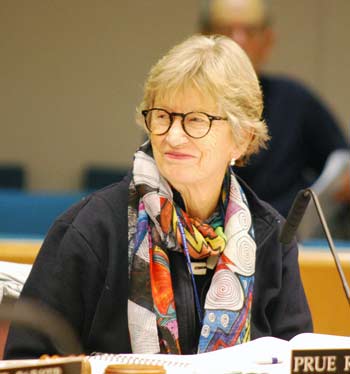
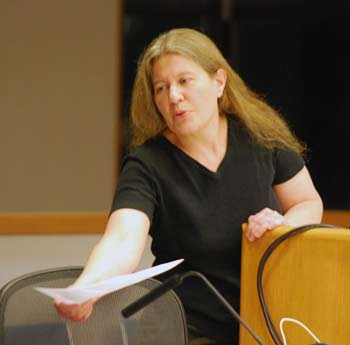
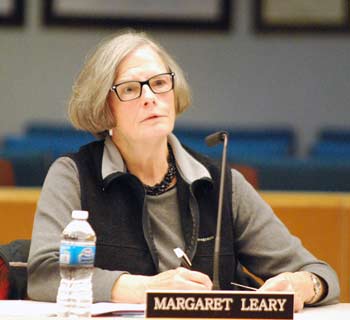
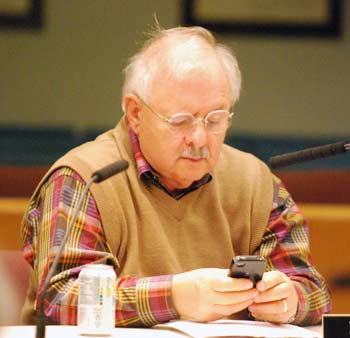
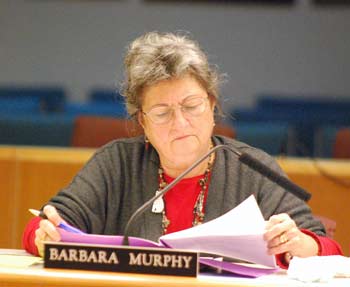
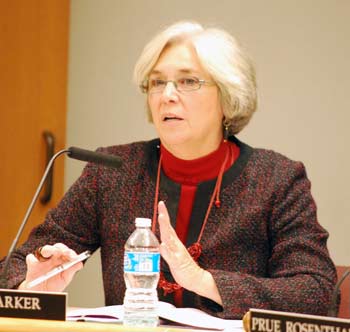
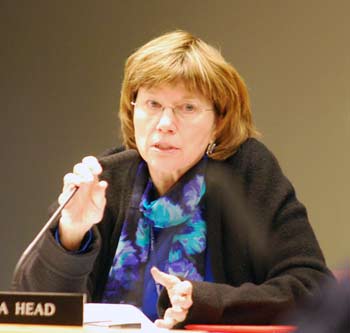
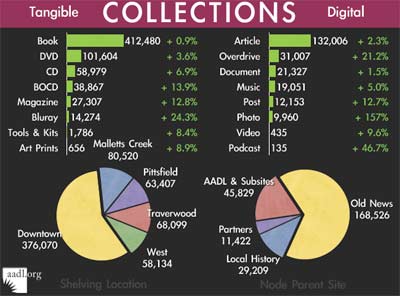
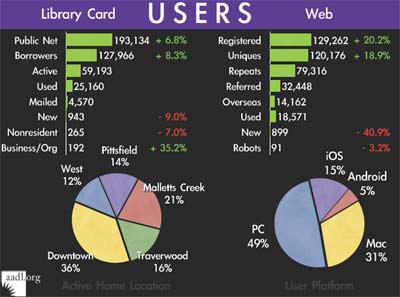
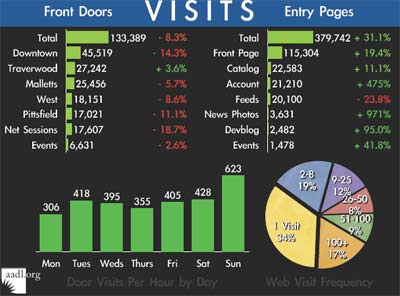
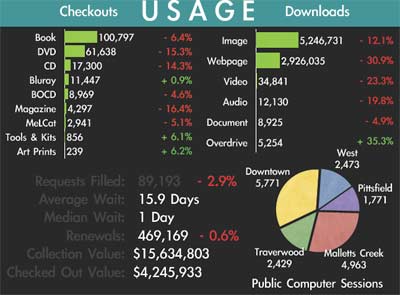
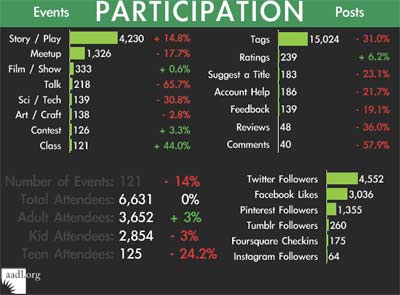
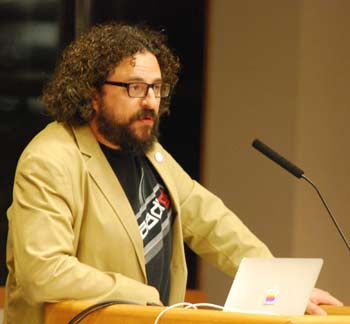
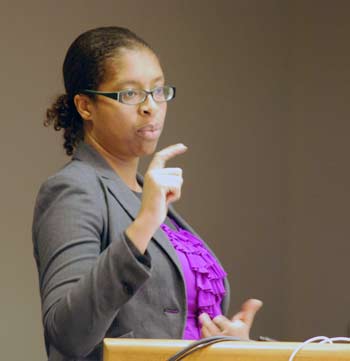
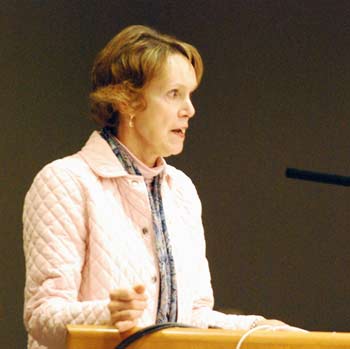
Allow me to reiterate my objection to the Ann Arbor District Library (AADL) board’s “opting-in” to the Pittsfield Township State Street Corridor Improvement Authority (CIA). The members of the AADL board were elected to represent the Ann Arbor constituents in actions that effect the finances and operations of the AADL. Their decision to have the AADL join the CIA was unilateral on their part and without requesting input from the electorate. The voters have a right to participate in the decision because, as a result of participating in the CIA, the AADL has committed Ann Arbor tax payers to paying more millage when requested than they would if none of the millage revenue were given to the CIA. Furthermore, no benefits for the AADL is evident from joining the CIA. The library board purportedly received modified terms pertinent to joining the CIA but these changes were never divulged to the public….
It is not too late to rectify the situation. The library board can reverse its “opt-in” decision during the several weeks left before the 60-day “opt-out” window closes. During this period of time the AADL board can survey Ann Arbor tax payers for their preferences to “opt-in” or to “opt-out” of the CIA. Inquiries about voters’ opinions can be obtained by sending letters to the legal addresses of all tax payers on record with the City Clerk’s office. Also the AADL board could arrange for feedback through its website and by direct email communication. This can be done but the question remains, will the library board make the effort? If the library board does not wish to be viewed as arrogant and autocratic then it should vigorously sponsor a survey….
After all, I am certain that Allerton Hill Consultants would encourage the survey and the AADL board is paying the consultant $28,000 to help improve its communications with Ann Arbor tax payers.
Regarding the Pittsfield Township Corridor Improvement initiative: To one who follows the AADL Board Meetings closely, apparent non sequiturs are routine. This is because there has rarely been much substantive discussion on the part of the Board during meetings which the public can attend. But at Monday’s meeting even I found the brief discussion (excepting the lone dissent by Board member Kaplan) and ensuing vote baffling.
If this was Point B for Board followers, Point A was the Sept.16 AADL Board meeting where the TIFF proposal was first presented (Chronicle: 9/27/2013). Board member Margaret Leary questioned CIA representatives Craig Lyon and Dick Carlisle at length.
(I hope I’m not cherry picking Leary’s comments in summing up her initial impressions.)
Leary: “… I’m struggling because [the Library is] not in the transportation business.”
(And a little later. First part Chronicle’s paraphrase:) Participating in the CIA would take that money away from books, speakers, building improvements – “all of the things that we were authorized by the voters who elected us to do.”
Better late than never, I have finally done my first read-through of the Allerton Hill report linked in this article. I encourage everyone who follows Chronicle Comments to do the same, and to encourage your contacts to do likewise. We may not ever be considered “Key Communicators” but we can keep the conversation going and offer input to AADL beyond the recommended survey.
Here are several questions in the interest of taxpayers:
Was this report what taxpayers got for the $28K spent by the library to improve communication
with us (the voters/taxpayers)?
Is the library extending the Allerton Hill contract? If so, what is the total projected payment to Allerton Hill this year?
Regarding Pittsfield Township Corridor Improvement:
Washtenaw Community College reacted very differently when asked by Pittsfield Township to hand over money to fix roads. (State St.) WCC Board of Trustees voted unanimously against it. They stated, “money that voters assign to education should stay in education.”
When Pittsfield Township came to the AADL board, Nancy Kaplan was the lone vote against it. The rest of our library board voted to give Ann Arbor library tax money to Pittsfield Township to fix roads.
[link]